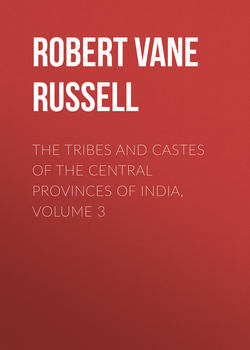Читать книгу The Tribes and Castes of the Central Provinces of India, Volume 3 - Robert Vane Russell - Страница 58
Gond
(f) Religion
40. Nature of the Gond religion. The gods
ОглавлениеThe religious practices of the Gonds present much variety. The tribal divisions into groups worshipping seven, six, five and four gods, already referred to, are generally held to refer to the number of gods which a man has in his house. But very few Gonds can name the gods of their sect, and the prescribed numbers are seldom adhered to. The worship of ancestors is an integral part of their religion and is described in the section on funeral customs. Bura Deo, their great god in most localities, was probably at first the sāj tree,69 but afterwards the whole collection of gods were sometimes called Bura Deo. He is further discussed subsequently. The other Gond gods proper appear to be principally implements and weapons of the chase, one or two animals, and deified human beings. A number of Hindu deities have now also been admitted into the Gond pantheon. The following account of the gods is largely taken from a note written by Mr. J. A. Tawney.70 The worship of the Gonds may be summarised as that of the gods presiding over the village destinies, the crops, and epidemic disease, the spirits of their forefathers and the weapons and creatures of the chase. The village gods are generally common to the Gonds and Hindus. They consist of stones, or mud platforms, placed at a convenient distance from the village under the shade of some appropriate tree, and often having a red or white flag, made of a piece of cloth, tied to the end of a pole to indicate their position. The principal village gods have been given in the article on Kurmi. Besides these in Gond villages there is especially Bhīmsen, who is held to be Bhima, one of the five Pāndava brothers, and is the god of strength. Ghor Deo71 is the horse god, and Holera, who is represented by a wooden bullock’s bell, is the god of cattle. Ghansiām Deo is a god much worshipped in Mandla. He is said to have been a prince who was killed by a tiger on his way to his wedding like Dūlha Deo. In northern Bastar the Gonds worship the spirit of a Muhammadan doctor under the name of Doctor Deo. A Gond of the place where the doctor died is occasionally possessed by his spirit, and on such occasions he can talk fluent Urdu. This man’s duty is to keep off cholera, and when the epidemic breaks out he is ordered by the Rāja to drive it away. The local method of averting cholera is to make a small litter covered with cloth, and in it to place a brass or silver image of the cholera goddess, Marai Māta. When the goddess is thus sent from one village to another it is supposed that the epidemic is similarly transferred. The man possessed by Doctor Deo has the power of preventing the approach of this litter to villages in Bastar, and apparently also can drive away the epidemic, though his method of doing this is not explained. The dealings of the Gonds with the Government of India are mainly conducted through chuprāssies or peons, who come to collect their revenue, obtain supplies and so on. The peons have in the past been accustomed to abuse their authority and practise numerous petty extortions, which is a very easy business with the ignorant Gonds of the wilder tracts. Regarding the peons as the visible emblem of authority, the Gonds, like the Oraons, have similarly furnished the gods with a peon, who is worshipped under the name of Kalha Deo with offerings of liquor and fowls. Besides this if a tiger makes himself troublesome a stone is set up in his honour and he receives a small offering; and if a platform has been erected to the memory of the founder of the village he is included with the others. The cholera and smallpox deities are worshipped when an epidemic breaks out. The worship of the village gods is communal, and in Chhīndwāra is performed at the end of the hot weather before seed is sown, houses thatched, or the new mahua oil eaten by the Gonds. All the villagers subscribe, and the Bhumka or village priest conducts the rite. If in any year the community cannot afford a public worship they hang up a little grass over the god just to intimate that they have not forgotten him, but that he will have to wait till next year.
69
Boswellia serrata.
70
Deputy-Commissioner, Chhīndwāra. The note was contributed to the Central Provinces Census Report for 1881 (Mr. Drysdale).
71
Ghora, a horse.
